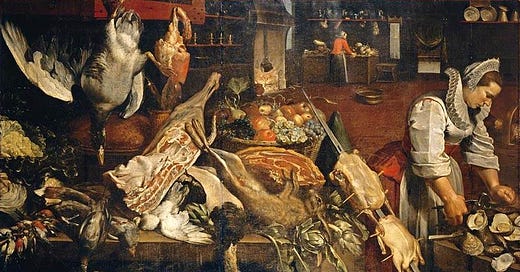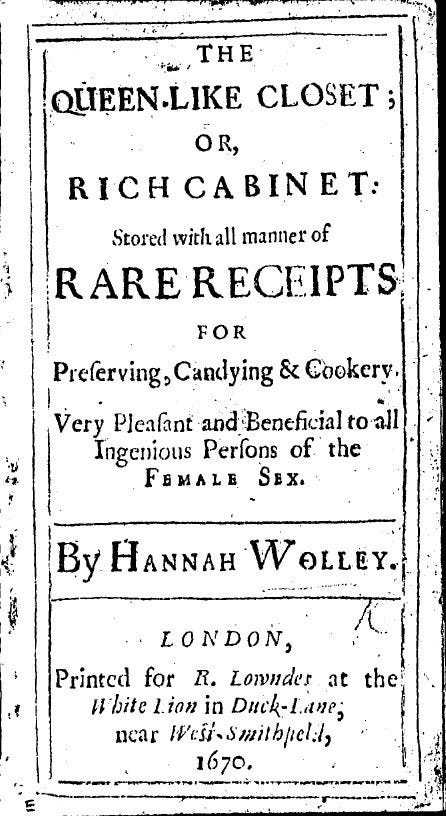Biscuits served with butter, jam and exploitation.
A 17th century recipe displaying the exploitation of the cooks in the centuries past. Take a look at what must have been going on in the downstairs kitchens of yesteryears behind the scenes....
I realize that looking back on old cookbooks sometimes can speak volumes. Take for example this 17th century bisket - cake recipe, which was obviously intended for afternoon tea.
We all have eaten biscuits - every region world wide has their ‘take’ on biscuits. Biscuit cakes easily range from serving as rustic bites and accompanying country style meals to adorning the servings at the most elegant teas…
I have chosen this particular ‘bisket-cake’ recipe from the book The Queen-like Closet or Rich Cabinet, by Hannah Wooley (1670).
This book proves to be a ‘fascinating’ shocking and quite out of the ordinary opportunity for us to better understand the daily lives of these people.. Especially for people from today’s world who are taking a look at this type of book for the first time, 354 years after it was written.
Take a closer look at this particular recipe and what it infers between the lines.
It truly sheds light on more than food preparation and recipes of the times.
‘Fascinating’, I wrote a few lines ago regarding this book.….I was being polite. Fascinating is a ‘mixed bag’ word, it covers a wide gamut of meaning, but as a word it is not pungent enough to describe the eye opening ‘read’ into the prevailing culture of daily life which these recipes offer.
Read on, and see for yourselves what I mean. You will better understand about the experience of working in the kitchens for the ‘gentle’ class of people at that time.
The “let them eat cake” mentality exposed through this ragile rose water infused bisket cake recipe ( I jump the timeline gun a bit with the Marie Antoinette quip, but the mentality is the same) does scream between the lines.
(Note : Fret not, ‘gentle reader’ (ha, I skipped ahead a good century this time for that insert, I couldn’t resist having a Bridgeton moment…but whatever…
__________________________________________________________________________________________________
This 17th century cookbook was given two titles:
The Queen-like Closet or Rich Cabinet
Written by Hannah Woolley and published in 1670, London. Printed for Richard Lowndes at the White Lion in Duck-Lane, near West-Smithfield, 1672.
(NOTE OF WARNING : Check out the complete title page from this book which I inserted below. Why?
Because this read might not be for you.
According to the author, if you are “ingenious” and “of the female sex”, this is not only meant for you, but it is considered to be “very pleasant” and “beneficial for you”. If you aren’t ingenious and of the female sex, (?) mutually exclusive (?), this probably isn’t for you, according to ‘her, who delightfully penned that publication of 1670’.)
You read my warning, proceed with caution…Here we go with the title page:
THE QUEEN - LIKE CLOSET or RICH CABINET:
Stored with all manner of
RARE RECEIPTS
For
Preserving, Candying and Cookery.
Very Pleasant and Beneficial to all Ingenious Persons of the
FEMALE SEX.
BY HANNAH WOLLEY.
The Second EDITION.
LONDON
Printed for Richard Lowndes at the White Lion in Duck-Lane, near West-Smithfield, 1672.
….
(You see, I didn’t make this up…the fun starts here…)
and now for the recipe….
“…To make the best Bisket-Cakes.
Take four new laid Eggs, leave out two of the Whites, beat them very well, then put in two spoonfuls of Rose-water, and, beat them very well together, then put in a pound of double refin'd Sugar beaten and searced, and beat them together one hour, then put to them one pound of fine Flower, and still beat them together a good while; then put them upon Plates rubbed over with Butter, and set them into the Oven as fast as you can, and have care you do not bake them too much.”
….
notes :
searced means sieved/sifted.
Have you any idea what kind of labor went in to make just a few of these ‘bisket-cakes’? Combine 4 egg yolks and 2 egg whites with a pound of sugar. And to beat this by hand for an hour so that it can be airy and light enough to withstand the drowning onslaught of a pound of flour. Expecting them to benefit from a meager schmear of butter on the pan before being thrown into the wood burning oven?
_________________________________________________
As if ‘they that have not’ didn’t suffer enough grief and trauma working in those conditions for ‘the haves’.
I pity the poor girls who worked those kitchens…as if the lifelong sentence of hard labor bestowed on them simply for being born into a specific demographic of people condemning them to those kitchens wasn’t enough…
Beyond the mind boggling fatigue these poor souls had to battle, they bore the trauma and wounds from the beatings which they endured at the time being “lowly servants” (commonplace behavior, see Dickens who captured and recorded these injustices and exploitations that still prevailed in the 19th century).
They also were defeated by the overwhelming exhaustion experienced from preparing the main meals for ‘the pampered ones who were never pleased and had no idea how labor intensive there every whim could be’ - preparing their meals was a task which was laden with the tragic absurdity of the out of touch, beyond repair, employers/drivers/owners.
The kitchen help- their work never ended. They had the responsibility of keeping the bounty of the farms and hunt properly preserved - to prevent these foods in the cellars and larders from rotting. This was a daunting task that would drive anyone into a state of constant anxiety. And lets not forget the outrageous demands placed on this kitchen help for keeping the tables of the powdered and perfumed unwashed ones abundantly filled with perfectly prepared bounty so that they can outdo the banquet/buffet/dinner table of another perfumed and powdered unwashed bored human. The majority of this subgroup of unwashed yet powdered and perfumed aristocrats owned so much that they assumed that they owned the people who worked for them as well.
On top of all that….
The kitchen cooks were expected to throw these biscuits together for the ladies upstairs, should they need them for tea….But, beating the eggs and rose water ‘very well’ and then adding the double refined beaten sugar and beating all that for ‘an hour’…and then beating in the flour for ‘a good while more’ is not a task that has guaranteed results. And in those quantities? Did you see the ratios? Imagine the anxiety of keeping an eye on that oven. That poor kitchen girl had to race against time with one of the most time consuming recipes. And her adrenalin, as she beat the daylights out of the pound of sugar with the 4 yolks and 2 whites, must have already shoved her into the {warning siren, blinking light ‘I must do this right or else’ danger zone}. She knew as she needed to ‘rush them’ onto the hearth, after hours of beating them by hand - all of her other tasks, however, on hold,- and she knew that they need to be baked ‘just so’, or else, failure. Failure was doom.
The wood had better have been burned to the ‘just right’ proportions of burning wood to glowing hot and cooling ash in order to ensure that optimal baking standard for these tender bisket-cakes. (Manual temperature setting of a wood burning oven - talk about narrow windows of time available…it’s throw those baking dishes of bisket cakes into the oven NOW or else the oven will get too cold for ‘perfect’ results.)
Note: A pound of sugar to 4 egg yolks and 2 egg whites, beaten by hand to be powdery and fluffy and with enough air incorporated to give it lift and rise?, and then a pound of flour to be beaten for a good while??? …is the butter ‘rubbed’ on the plates enough to hold this together? How easily could these bisket -cakes become little rock like discs? Easily.
(If not done correctly, there would have been more beatings going on downstairs, then just that of the ingredients. Either beatings or the disgrace of being sacked, which comes part and parcel with the heavy burden of being banished from those kitchen to return to one’s family already plagued by destitution/hunger.)
ah…how times have changed.
somewhat.
actually, some things never change.
they just change format.
at least we have ovens and food processors.
that’s something.
the greatest diversion is sometimes planted through ease.
what did our ancestors endure around the world a few centuries ago?
or
perhaps, what did our ancestors make others endure?
we come down a line of succession from either ‘direction’.
generational trauma? is it really a ‘thing’ ?
how much has the world really changed?
Sometimes food can tell the story of human culture better than a history book. But aren’t they always written by the victorious?
At least, that is what we have been told…






